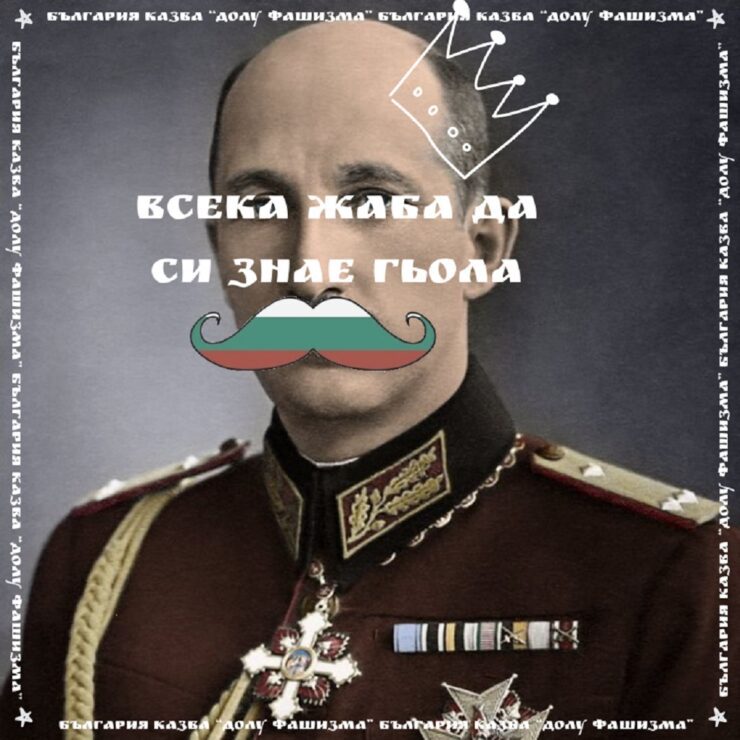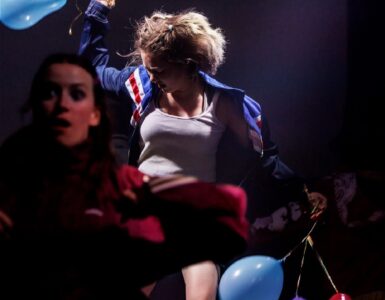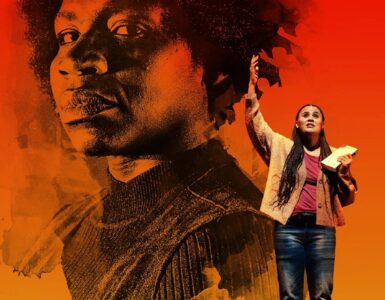Acknowledging that facets of history find their way to prominence depending on who tells them was a shrewd move by The Brief Life & Mysterious Death of Boris III, King of Bulgaria‘s writers Joseph Cullen and Sasha Wilson. The show has a complicated relationship with its’ central character – and unfortunately the complications are not simply limited to him. The show’s camp demeanour offers some laughs, which are well needed given the brazen effort to tell the story of Bulgaria’s tumultuous relationship with its’ King, Germany, Borders, and the Holocaust in just 70 minutes. While its’ historical breadth is impressive, the piece has a difficult relationship with authenticity and characterisation that left me conflicted about its’ approach.
Setting out to re-contextualise the story of the titular King, whose story is not part of the canonical Western historical learnings of World War II, is no mean feat in such a short space of time. Out Of The Forest should be praised for their pure commitment to telling this story in its’ entirety – from Boris mounting the throne for the first time all the way up until his untimely death. The piece takes a whimsical approach to this catatonic speedrun of his reign, as Cullen takes centre stage portraying Boris while a cast of four performers rotate around him in a many myriad roles – from Nazi Bureaucrats parachuted into the country to rebellious Jewish musicians.
The piece begins by explaining the sticky situation Bulgaria found itself in the lead-up to the Second World War – with few kind allies in Europe and spheres of influence lapping and lapsing with various cultural and political reasonings. The piece goes on to document Boris’ reluctant decision to ally with Nazi Germany, and then the creeping influence of the Reich that ends with Boris little more than a puppet of his Hitler-aligned Prime Minister. In recourse, the Bulgarian Church begins baptising Jews to try and save them from deportation to labour camps in Central Europe, while a Jewish musician makes an unlikely alliance with an inside source to try and save her people from genocide.
With well-meant intentions the piece boldly states that although it has to tell the stories of the Nazi characters within the piece, the focus is on centring the narrative of the good guys. Unfortunately it feels as though the stories of those good guys, the Bishop and the Jewish Musician, are left threadbare thin in favour of the story of Boris’ quite pitiful demise into submission to the Third Reich and eventual attempted redemption. Historians debate the role that Boris played in defying the Nazi regime, and one positive of the piece is how well they convey the complicated nature of his position.
The piece does well to reflect on the moral ambiguity surrounding the fact that while Bulgaria saved 50,000 Jews, Boris was unable to stop the deportations in Bulgaria’s proclaimed territories of Thrace, Macedonia and Pirot – places he had been promised to gain in the aftermath of the War. However, we are left without the details of the perhaps more interesting stories of the peripheral rebels that facilitated the subversion of Nazi orders, who appear miasmically in contrast to the time dedicated to the main man. Instead, we spend more time focusing on Boris’ often quite fruitless political posturing and then see him finally finding the words to defy Hitler directly.
In the throes of quick-witted humour, violin-assisted slapstick tension-builds, and flamboyant characterisations the piece struggles to find an authentic voice to impact the truths of the story it wants to tell. The piece continually tells us, a British audience, that we should rely less on the culturally traditional narratives of “that last scene in Blackadder” and Dad’s Army, yet I struggled to feel the piece offers up any form of cultural alternative.
The decision to perform the piece in natural British and American accents for the Bulgarian roles could work, a la HBO’s Chernobyl. Unfortunately the addition of the hammed up German, French, and Australian impressions set amongst the broader campy demeanour of the show’s storytelling style leaves the whole journey feeling a little bit Carry On Bulgaria. Some references to Bulgarian food, places, and words are thrown into conversation but judder in the fact that the piece has clearly been written to satisfy a British audience. Given the piece’s origins, the clearly great amount of research done, and development with Bulgarian choristers on the show’s music, I had hoped for better.
The piece has a little bit of self-awareness, even going so far as to mention in a joke that they considered centring women’s narratives but apparently it “doesn’t sell”. While the piece manages to continually and regularly find a Feminist critique of the show through offhand lines from female characters, it struggles to ever succinctly deploy it, leaving it feeling like a bit of an afterthought.
The music is performed exceptionally, with gorgeous Bulgarian and Jewish Folk Tunes seamlessly adding a bit of well-needed cultural flourish. Unfortunately they juxtapose a wider lack of clear cultural identity, which in telling the story of a national rebellion you would really hope to see. The actors’ over-the-top performances work best in the Gig Theatre sections where the music accompanies that sense of whimsy, but I can’t help feeling this piece lacks the dramatic chops to offer up an impactful version of this story.
Recommended Drink: A shot of Rakia will help this one go down nicely!
You can catch The Brief Life & Mysterious Death of Boris III, King of Bulgaria at PleasanceDome – Queen Dome until August 28th (not the 14th) at 17:20. Tickets are available through the EdFringe Box Office.









